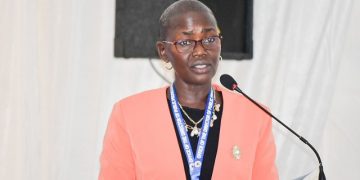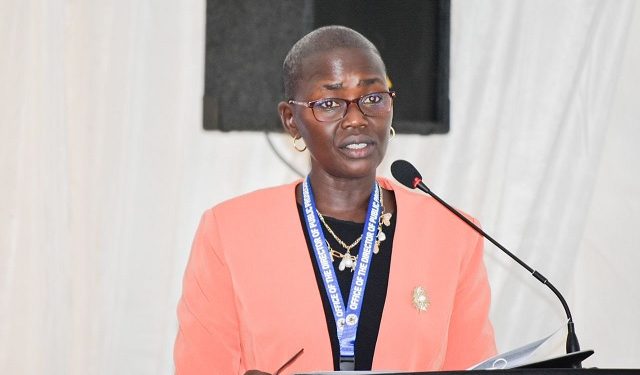The Director of Public Prosecutions Jane Frances Abodo has decried the high levels of understaffing in her office saying that currently, at least 201 out of the 238 operational courts do not have prosecutors.
This amounts to 84.4 percent of the courts lacking a prosecutor, which hinders the timely dispensation of justice.
Abodo disclosed the alarming situation in her office to Uganda Radio Network on the sidelines of an event held at Sheraton Hotel in Kampala, to launch three books that are supposed to guide prosecutors to enable them to properly handle cases related to Gender-Based Violence.
The books were developed by the office of the DPP with support from the United Nations Women and International Justice Mission.
One is titled the Cross Sectoral Handbook for Victim Centered Investigation, Prosecution and Adjudication of Gender Based Violence-GBV Cases, and the other is Multi-Disciplinary Training Curriculum on GBV and Violence against Children.
However, according to DPP Abodo, prosecuting gender-based violence requires them to be in all courts across the country which is currently difficult.
But she notes that although many sectors in the justice system are understaffed, when it comes to the office of the Director of Public Prosecutions, the situation is chronic.
Abodo explains that they used to be 324 prosecutors but some of them have since crossed from the office of the DPP to the Judiciary looking for greener pastures and currently, they are about 300 prosecutors handling a population of more than 40 million people which makes them get strained with work.
The country’s chief prosecutor Abodo adds that by the end of August 2021, they did not have prosecutors in 102 courts in the country and now that the Judiciary has recruited and deployed 90 Magistrates and five Judges in the last two months and they are still recruiting, they are now left with much less manpower, leaving 201 courts lacking prosecutors, which affects the dispensation of justice.
As such, Abodo says there is need to recruit more prosecutors to match the increasing number of courts in the country and also to be able to tackle the case backlog issue.
The annual performance report issued by the Judiciary last month indicated that there were more than 150,000 cases in the backlog in the justice system during the financial year 2020/2021.
In Uganda, a case is considered in backlog when it has spent more than two years in the justice system without being concluded.
To Abodo, if the government recruits more prosecutors to bridge the understaffing levels in her office, the issue of backlog can also be eliminated in the Judiciary.
It is not uncommon to see criminal proceedings failing to take place in courts when the prosecutors are absent and at times cases getting dismissed for want of prosecution which affects the dispensation of justice to both the victims and the accused persons as well as wastage of resources for the judicial officers who come to preside over the flopped cases.
Meanwhile, when asked about the purpose of the books that have been launched, Abodo explained that she had an opportunity to review them and found that they offer practical solutions to practitioners in the field of law and good accepted international standards in handling cases of GBV.
“The prosecutors still lack practical skills of interviewing, communicating and engaging with the children that they come into contact with,” said Abodo.
“Suffice it to note that the legal field is a dynamic area which requires continuous training for the prosecutors to be able to effectively execute their mandate.”
She went on: “The handbook and training manual come in handy to enable the office achieve that purpose. It is important for prosecutors to have basic information on trauma so that they know how to engage with victims of violent crime during the legal process so as to get meaningful information. This will in turn lead to improved conviction rate.”
On her part speaking at the launch, Adekemie Ndieli, the Deputy Country Representative for UN Women noted that the books if used correctly will not only effectively equip duty bearers with requisite knowledge and skills but will also provide a unique opportunity to address the most persistent challenges to the access to justice for women and girls.
Ndieli mentioned some of these challenges as failure to address the psychological, social and structural barriers often faced by survivors when reporting the cases among others.
The Principal Judge Dr Flavian Zeija who was represented by the head of High Court Civil Division Justice Musa Ssekaana, revealed that most of the criminal cases in the justice system are related to Gender-Based Violence and that if the publications are used properly, they will facilitate the Judiciary in dispensing justice and making meaningful decisions.URN









